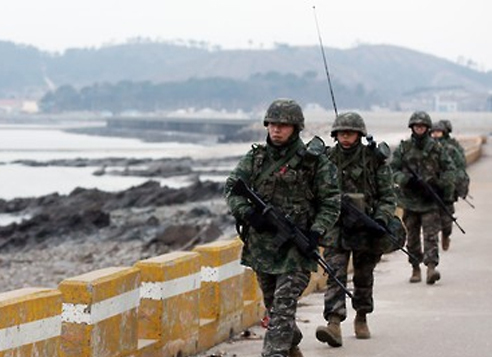South Korea's defense ministry said Friday it has started working-level preparations for the implementation of reform measures proposed by President Moon Jae-in during his campaign.
"With regard to the presidential campaign pledges on the defense sector, of course, we are reviewing conditions and ways for implementation," Moon Sang-gyun, a spokesman for the Ministry of National Defense, told reporters.
"With regard to the presidential campaign pledges on the defense sector, of course, we are reviewing conditions and ways for implementation," Moon Sang-gyun, a spokesman for the Ministry of National Defense, told reporters.

Moon's promises include shortening the service period for conscripted soldiers to 18 months from the current 21. All able-bodied South Korean male adults are obliged to serve in the military.
The official stressed that the ministry will do its best for national security in respect of the commander-in-chief's policy.
The new South Korean leader is expected to push for a far-reaching reform of the country's armed forces in order to counter North Korean military threats more powerfully and efficiently.
He supports an increase of the country's defense budgets to around 3 percent of the gross domestic product, tallied at US$1.47 trillion, from the 2.4 percent now.
It's aimed at upgrading weapon systems, training elite forces and raising wages for soldiers.
He instead wants to reduce the number of troops from the current 625,000 to 500,000 by 2020.
He is also determined to promote Seoul's own defense capabilities on the basis of a robust alliance with Washington.
"The era has come that a nuclear submarine is necessary for us," Moon said at a forum last month. "For this, (I) will discuss a revision to the nuclear accord (between the allies)."
Under the agreement, South Korea's nuclear activity is limited to peaceful purposes, which means a setback for the production of uranium with relatively high enrichment for use as fuel.
In addition, his administration will seek to complete the establishment of South Korea's independent missile shield, called the Korean Air and Missile Defense (KAMD), at an early date amid speculation that it may introduce sea-based SM-3 interceptor missiles.
The nomination of his defense minister, expected as early as next week, will be the starting point, defense experts said.
Before the election, Moon stressed the need for a civilian to lead local troops, which is unprecedented in its modern history.
Internal stability is a concern amid the nuclear-armed North's continued saber-rattling, said the experts.
Several retired commanders are on the reported shortlist of candidates. Among them are Song Young-moo and Hwang Ki-chul, both of whom served as the Navy chief of staff, and Park Jong-hun, former Air Force chief of staff.
If Moon picks such a figure with no Army background, it could be an alternative, as South Korea's military has been traditionally dominated by ground troops in power and size.
The number of Army service members totals around 490,000 out of the 630,000-strong military.
Whoever becomes Moon's first defense minister will likely play a key role in crafting a blueprint for a specific reform scheme and timetable.
Moon, formerly a human rights lawyer, has vowed to decentralize and devolve his presidential power to ministries in charge of related state affairs.
Once the tensions subdue on the peninsula and inter-Korean ties improve, the president may seriously consider a civilian nominee for the defense ministerial post, observers said. (Yonhap)




![[Herald Interview] 'Amid aging population, Korea to invite more young professionals from overseas'](http://res.heraldm.com/phpwas/restmb_idxmake.php?idx=644&simg=/content/image/2024/04/24/20240424050844_0.jpg&u=20240424200058)












![[KH Explains] Korean shipbuilding stocks rally: Real growth or bubble?](http://res.heraldm.com/phpwas/restmb_idxmake.php?idx=652&simg=/content/image/2024/04/25/20240425050656_0.jpg&u=)

